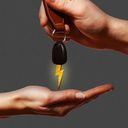Tomorrow's car dealership might look more like the Apple Store

Gasoline-powered cars could soon start to disappear, but car dealers aren't going anywhere, in part because they're protected by strong franchise laws.
- Their business is changing fast, however, as car sales move online and electric vehicles get more popular.
Why it matters: Consumers have plenty of gripes about the car-buying process. But they still want to visit with knowledgeable specialists to learn about advanced technology and troubleshoot problems.
- First-time EV buyers have lots of questions about charging and more. Down the road, pre-owned EV buyers will need more hand-holding, too.
- Dealerships that adapt best will look something like the automotive version of Apple's Genius Bar, experts say.
Driving the news: Carmakers are delivering an ultimatum of sorts to their franchised dealers: Evolve and invest for the EV era, or say goodbye.
- Ford dealers, for example, have until the end of October to decide whether to invest up to $1.2 million on chargers and other EV-related services. (The automaker wants its dealer network to serve double duty as a public charging network.)
- Those who refuse won't be allowed to sell future Ford EVs, although they'll have a second chance to get on board in 2027.
- Other brands, including GM and Hyundai, are demanding similar changes.
- They all want to compete with disruptive EV makers like Tesla, which sells directly to consumers and handles maintenance through a network of mobile technicians and service centers.
The intrigue: Some experts say automakers are using the shift to EVs as a way to thin their dealer ranks.
- When General Motors presented a similar choice to its 900 Cadillac dealers in 2020, more than a third opted for a buyout instead. The rest are all-in on EVs.
The big picture: Car dealers are raking in profits right now because pandemic-related supply chain disruptions mean they have fewer cars to sell and can charge higher prices.
- Meanwhile, EVs are becoming more popular. They currently account for about 5% of new car sales, but that share is expected to grow significantly over the next decade.
- On Thursday, New York Gov. Kathy Hochul said the state will follow California in mandating 100% zero-emissions for new vehicles by 2035.
All of this adds up to momentous changes for car dealers and their customers.
- Yet car shoppers overwhelmingly prefer the dealer experience to online shopping, according to a new study from Escalent, a human behavior and analytics firm. 57% prefer the traditional approach, while just 20% favor Tesla's direct retail model.
- When it comes to EVs, 74% said they would prefer to buy one at a dealership, rather than from an auto manufacturer or third party.
- Nearly one-third of shoppers expect car dealers to be a primary source of EV information.
The surprising results contradict popular opinion that consumers want to buy cars the way they do shoes or groceries.
- What they want, it turns out, is more education and less hard sell, Escalent vice president K.C. Boyce tells Axios.
- "When EVs go mainstream, you can't underestimate the amount of hand-holding that will be needed."
Yes, but: Secret shopper surveys find that dealers aren't well-prepared to sell EVs.
- They don't know enough about charging, for example, and don't always inform customers about warranties, rebates and incentives.
The other side: Many automakers weren't yet selling EVs when these surveys were conducted several years ago.
The bottom line: Carmakers insist their dealer networks can be an asset in the EV era because of their physical locations and their existing customer relationships.
- But those dealers have a lot of work to do before they're EV experts.
Editor’s note: This story has been updated to clarify that some car dealers weren’t selling EVs when the secret shopper studies were done several years ago.